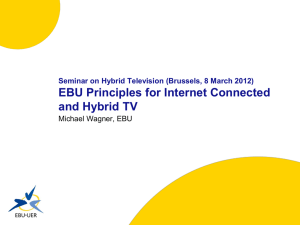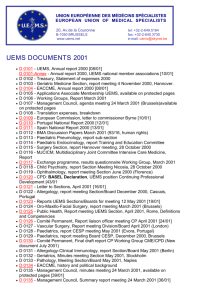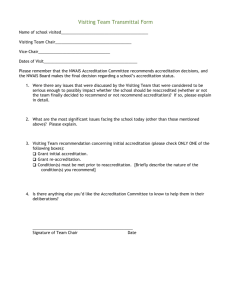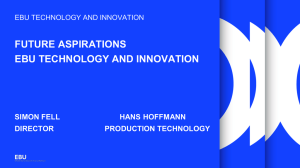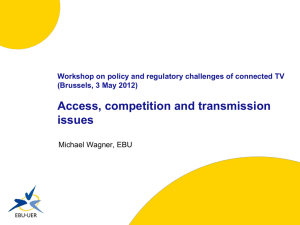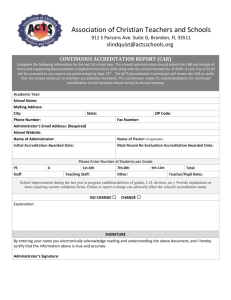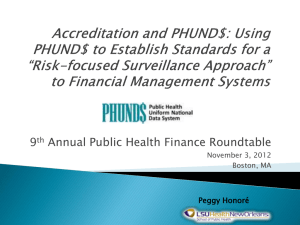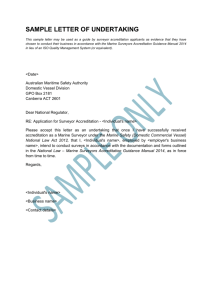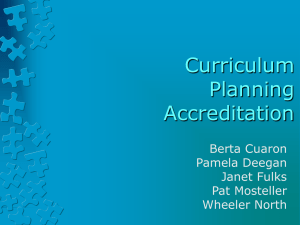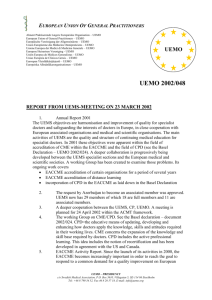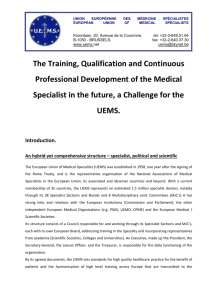DRAFT MEETING ACCREDITATION COMMITTEE MINUTES Date
advertisement
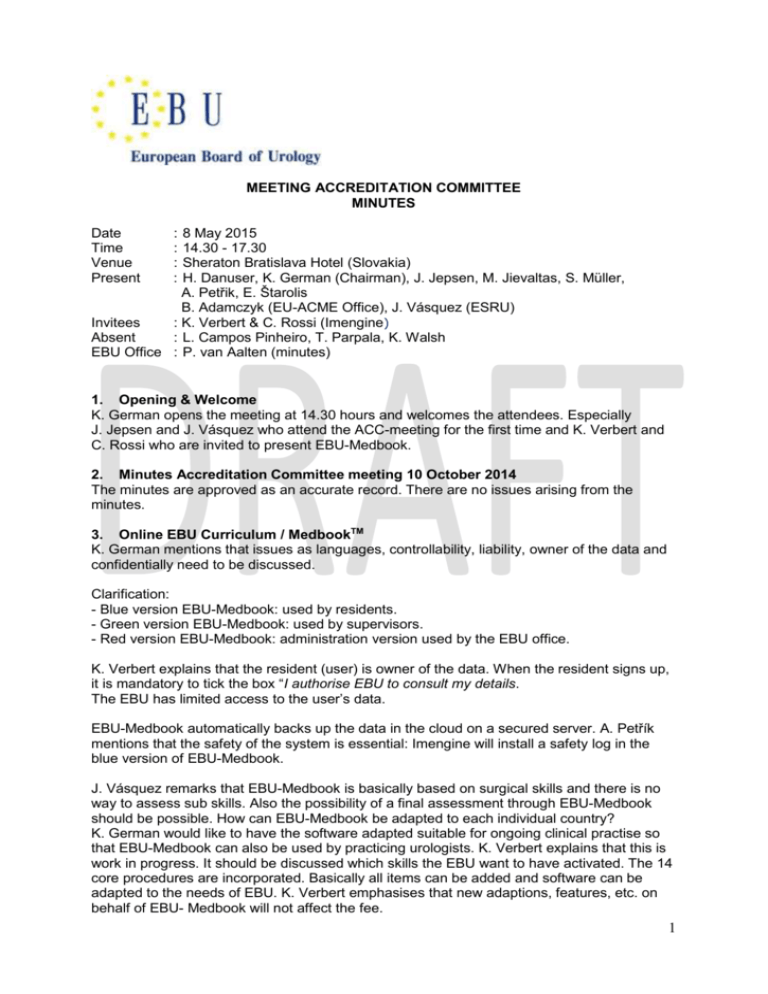
MEETING ACCREDITATION COMMITTEE MINUTES Date Time Venue Present : : : : 8 May 2015 14.30 - 17.30 Sheraton Bratislava Hotel (Slovakia) H. Danuser, K. German (Chairman), J. Jepsen, M. Jievaltas, S. Müller, A. Petřik, E. Štarolis B. Adamczyk (EU-ACME Office), J. Vásquez (ESRU) Invitees : K. Verbert & C. Rossi (Imengine) Absent : L. Campos Pinheiro, T. Parpala, K. Walsh EBU Office : P. van Aalten (minutes) 1. Opening & Welcome K. German opens the meeting at 14.30 hours and welcomes the attendees. Especially J. Jepsen and J. Vásquez who attend the ACC-meeting for the first time and K. Verbert and C. Rossi who are invited to present EBU-Medbook. 2. Minutes Accreditation Committee meeting 10 October 2014 The minutes are approved as an accurate record. There are no issues arising from the minutes. 3. Online EBU Curriculum / MedbookTM K. German mentions that issues as languages, controllability, liability, owner of the data and confidentially need to be discussed. Clarification: - Blue version EBU-Medbook: used by residents. - Green version EBU-Medbook: used by supervisors. - Red version EBU-Medbook: administration version used by the EBU office. K. Verbert explains that the resident (user) is owner of the data. When the resident signs up, it is mandatory to tick the box “I authorise EBU to consult my details. The EBU has limited access to the user’s data. EBU-Medbook automatically backs up the data in the cloud on a secured server. A. Petřík mentions that the safety of the system is essential: Imengine will install a safety log in the blue version of EBU-Medbook. J. Vásquez remarks that EBU-Medbook is basically based on surgical skills and there is no way to assess sub skills. Also the possibility of a final assessment through EBU-Medbook should be possible. How can EBU-Medbook be adapted to each individual country? K. German would like to have the software adapted suitable for ongoing clinical practise so that EBU-Medbook can also be used by practicing urologists. K. Verbert explains that this is work in progress. It should be discussed which skills the EBU want to have activated. The 14 core procedures are incorporated. Basically all items can be added and software can be adapted to the needs of EBU. K. Verbert emphasises that new adaptions, features, etc. on behalf of EBU- Medbook will not affect the fee. 1 K. Verbert demonstrates EBU-Medbook from a resident’s (“blue version”) and a reviewer’s (“green version”) perspective. After 5 years, users of the blue version will receive an e-mail from Medbook asking if they want to continue with the green version. OSATS (Objective Structured Assessment of Technical Skills): -The supervisor does not need to sign-off each new procedure immediately; this can be done when the resident requests an evaluation, or when the supervisor receives an automated monthly sign-off reminder. - OSATS can also be evaluated based on a score system. - The resident decides who has access to his/her EBU-Medbook. - The purpose of the field “satisfaction of assessor” is discussed. According to S. Müller it will lead to more interaction between the resident and the supervisor. CME-points: - In Belgium the CME-points are automatically registered in Medbook. - Splitting national and international points is possible. Mobile app: An iPhone-APP is available; scanning and directly uploading is possible. Directly importing pictures taken with an iPhone in Medbook is work in progress. In the green version of EBU-Medbook the urologist can keep a record of the complications. In the (near) future governments will ask for those numbers. Regarding safety the question is of these statistics should be registered in EBU-Medbook, or on a hospital level. Most likely hospital data will also move to a cloud in the near future. J. Vásquez remarks that a field should be added to fill in the rate or level of incontinence. K. German remarks that it would indeed be useful to have a “yes” and “no” box and to leave it up to the user to fill it in or not. A. Petřík remarks that on a national level you need to identify the case by noting the patient’s name and date of birth. K. Verbert answers that the “remarks” field is not meant for this and he shows how this is done in Medbook developed for Anaesthetists. S. Müller informs the ACC-Committee that with the support of the German Urological Associations he managed to get full sponsorship for the German version of the EBUMedbook for 5 years for incoming German residents as of October 2015. One of the consequences is that if residents use it, also the head of the department must start using it. EBU-Medbook might be a useful tool for the Czech as it is likely that in the near future more numbers of procedures need to be recorded. A. Petřik foresees that the Czech Urological Association will be prepared to pay the EBU-Medbook fees for the Czech residents. According to J. Vásquez and J. Jepsen new Danish residents are obliged to keep an online logbook starting this year. There are ± 12 residents a year; urology training is 6 years, no exit exam. At the end of the residency the logbook must be submitted to the Ministry; after verification the resident will receive the licence. They think that financing of EBU-Medbook will not be a problem. M. Jievaltas and E. Štarolis from Lithuania assume that the financing will not raise any problems for their 4-5 residents. 2 4. UEMS-EACCME 4.1. The Accreditation of e-Learning Materials by the EACCME The UEMS recognises that considerable advances are being made in the methodologies by which CME and CPD can be provided, and by which these educational opportunities are accessed by doctors. For this reason, the UEMS provides for the accreditation by the EACCME of new media (“e-Learning materials”) for the delivery of e-CME/e-CPD. In the letter “UEMS 2011/20” the EACCME describes the criteria and mechanisms for its accreditation of e-Learning materials. The criteria are divided in 59 subdivisions. The example is taken of the ESOT (European Society for Organ Transplantation) which has developed an educational platform. According to the EACCME, ESOT is the provider and can therefore not perform the accreditation. The issue of programme accreditation versus provider accreditation (not offered by EACCME) requires further investigation. About 5 e-Learning activities need to be accredited per year. Although it takes time to get acquainted with the evaluation procedure it is decided that all committee members are involved in this procedure. B. Adamczyk will randomly appoint a committee members; the assigned committee member informs the EBU office within 1-2 days if he/she is able to evaluate the activity within the deadline (1 week); otherwise another member will be chosen. 4.2. UEMS Advisory Council on Continuing Medical Education meeting 29-11-2014 B. Adamczyk attended the meeting; she informs the committee about the highlights: - In 2015 the UEMS Governance Board on CME/CPD will enable its members and providers to comment on revisions and the new criteria regarding Live Educational Events. - To assess the independence of the scientific programme, National Accreditation Authorities consider on-site visits carried out by the UEMS Sections are the most reliable way. - The EACCME will explore the issue of accreditation of international peer-reviewed articles. The challenge will be the recognition by the National Accreditation Authorities. - The accreditation system in The Netherlands is still national. The EACCME will explore the potential to have an agreement signed with the EACCME. - The EACCME accepts separate applications for accreditation but the participants cannot claim double credits. The EACCME accredits maximum 3 credits for a half-day and 6 credits for a full day. This is defined in document UEMS 2012/30; EACCME is willing to review this in the light of experience. Although the course-organiser can advise a number of credit points, the EBU will assign credit points based on the scientific programme and the EACCME takes the final decision. 4.3 My EU-ACME on www.eu-acme.org B. Adamczyk sees possibilities for connecting the CME-database with EBU-Medbook in the future. A. Petřik mentions that collecting credits in Czech Republic is not mandatory; the Czech Medical Chamber only obliges Department Heads to submit an overview of credit points. 5. Any other business EBU logbook: M. Müller mentions that the Executive Committee discussed the EBU paper logbook; this logbook must be submitted for the EBU Oral Examination and needs updating. Some candidates already sent in a copy the electronic EBU-logbook which will be replaced by Medbook in due course. Making EBU-Medbook obligatory for the EBU Oral Examination in the future may be discussed by the Executive Committee. Next meeting: Friday 9 October 2015 in Bruges (Belgium). 6. Closing K. German thanks the attendees for their contribution and closes the meeting at 17.00 hours. 3

